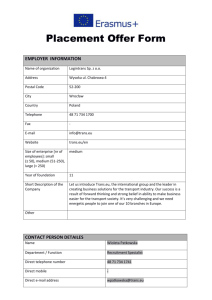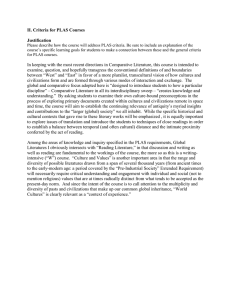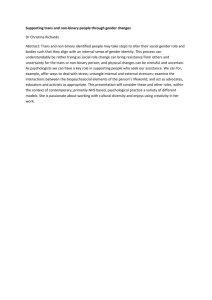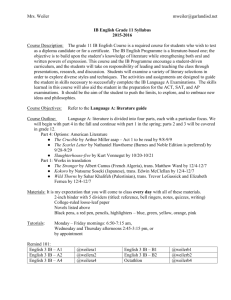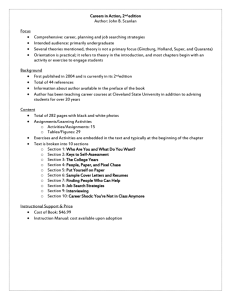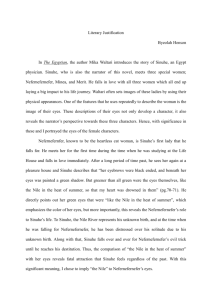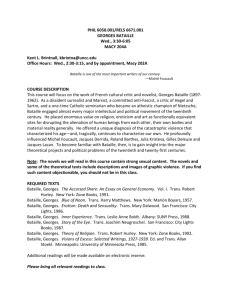course description
advertisement
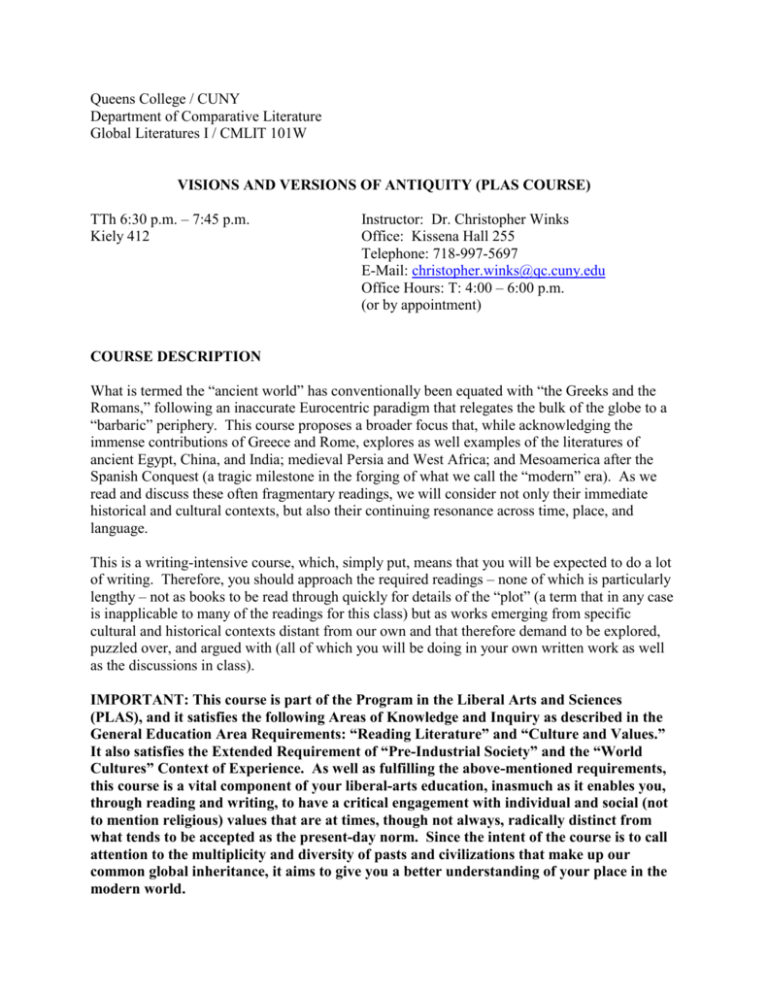
Queens College / CUNY Department of Comparative Literature Global Literatures I / CMLIT 101W VISIONS AND VERSIONS OF ANTIQUITY (PLAS COURSE) TTh 6:30 p.m. – 7:45 p.m. Kiely 412 Instructor: Dr. Christopher Winks Office: Kissena Hall 255 Telephone: 718-997-5697 E-Mail: christopher.winks@qc.cuny.edu Office Hours: T: 4:00 – 6:00 p.m. (or by appointment) COURSE DESCRIPTION What is termed the “ancient world” has conventionally been equated with “the Greeks and the Romans,” following an inaccurate Eurocentric paradigm that relegates the bulk of the globe to a “barbaric” periphery. This course proposes a broader focus that, while acknowledging the immense contributions of Greece and Rome, explores as well examples of the literatures of ancient Egypt, China, and India; medieval Persia and West Africa; and Mesoamerica after the Spanish Conquest (a tragic milestone in the forging of what we call the “modern” era). As we read and discuss these often fragmentary readings, we will consider not only their immediate historical and cultural contexts, but also their continuing resonance across time, place, and language. This is a writing-intensive course, which, simply put, means that you will be expected to do a lot of writing. Therefore, you should approach the required readings – none of which is particularly lengthy – not as books to be read through quickly for details of the “plot” (a term that in any case is inapplicable to many of the readings for this class) but as works emerging from specific cultural and historical contexts distant from our own and that therefore demand to be explored, puzzled over, and argued with (all of which you will be doing in your own written work as well as the discussions in class). IMPORTANT: This course is part of the Program in the Liberal Arts and Sciences (PLAS), and it satisfies the following Areas of Knowledge and Inquiry as described in the General Education Area Requirements: “Reading Literature” and “Culture and Values.” It also satisfies the Extended Requirement of “Pre-Industrial Society” and the “World Cultures” Context of Experience. As well as fulfilling the above-mentioned requirements, this course is a vital component of your liberal-arts education, inasmuch as it enables you, through reading and writing, to have a critical engagement with individual and social (not to mention religious) values that are at times, though not always, radically distinct from what tends to be accepted as the present-day norm. Since the intent of the course is to call attention to the multiplicity and diversity of pasts and civilizations that make up our common global inheritance, it aims to give you a better understanding of your place in the modern world. REQUIRED TEXTS (photocopies to be distributed in class; books available from Queens College Bookstore -- only the listed translations should be used) The Tale of Sinuhe and Other Ancient Egyptian Poems: 1940-1640 B.C. Ed. and trans. R.H. Parkinson. Oxford UP. Sappho. Trans. Mary Barnard. U. of California P. Herakleitos and Diogenes. From Seven Greeks, trans. Guy Davenport. Photocopies. Bhagavad-Gita: The Song of God. Trans. Swami Prabhavananda and Christopher Isherwood. Signet. Laozi. Dao De Jing: The Book of the Way. Trans. and commentary, Moss Roberts. U. of California P. Petronius. The Satyricon. Trans. William Arrowsmith. Meridian. Omar Khayyám, The Quatrains of Omar Khayyám: Three Translations of the Rubáiyát. Trans. Edward Fitzgerald, Justin McCarthy, Richard Le Gallienne. D.T. Niane. Sundiata: An Epic of Old Mali. Trans. G.D. Pickett. Longman. Miguel León-Portilla (ed. and intro.). The Broken Spears: The Aztec Account of the Conquest of Mexico. Trans. Lysander Kemp. Beacon. COURSE OBJECTIVES The purpose of this course is to develop your critical reading and writing skills so that you are able to discern common threads and convergences as well as divergences in a range of literary works drawn from a time span encompassing roughly 3,500 years. You should come away from this course with a heightened awareness of how literature matters, of its power to challenge and shape our knowledge of the world and its multiple pasts. COURSE REQUIREMENTS You must complete all assigned readings and be prepared to discuss them and write about them in class. Seven (7) assignments will be required from all course participants, as follows: 1. Three (3) papers, two of which will be short interpretive essays (a maximum of 6 typewritten double-spaced pages each), which will involve your own response to a choice of questions I will give you two weeks before the due date; and a third, longer (10-12 page) paper incorporating two outside critical sources. You will hand in a first draft of this second paper for my comments and suggestions, and then you will turn in a revised final version towards the end of the semester. 2. Two (2) in-class writing assignments, also based on a choice of at least two questions handed out at the beginning of class. 3. A midterm exam covering the material up to that point. 4. A final exam that will survey the entire semester’s readings, but will emphasize the work done in the second half of the semester. It is particularly important for you to be punctual and to attend class regularly, the more so as there will be no “make-ups” for the in-class work; these assignments must be done on the day indicated in the syllabus. You are expected to complete all of your assignments. Under only the direst personal circumstances will I accept late take-home papers. I have supplied the due date for assignments on the syllabus, so you should mark your calendars accordingly. Failure to turn in an assignment will have a negative effect on your final grade even if you do well on those assignments you do hand in. Any cases of plagiarism will be penalized with a failing grade. EVALUATION Your work in this class will be graded according to the A-B-C-D-F scale. I do not grant “Incomplete” grades (except in the event of a severe and verifiable medical and personal emergency), nor do I give “extra credit” assignments. You must satisfy all course requirements outlined in the previous section. Two short essays (6 pages maximum ea.) Two in-class writing assignments Midterm exam Final research paper (10-12 pages) Final exam 30% of the grade 20% of the grade 15% of the grade 20% of the grade 15% of the grade COURSE OUTLINE Week 1 (8/31) Introduction to course. Begin reading The Tale of Sinuhe and Other Ancient Egyptian Poems (21-102; 151-165; 246-272). Week 2 (9/5, 9/7) The Tale of Sinuhe, etc. Week 3 (9/12, 9/14) The Tale of Sinuhe, etc. FIRST IN-CLASS WRITING ASSIGNMENT 9/14. Week 4 (9/19, 9/21) Sappho, Poems and Fragments; Herakleitos and Diogenes (photocopies). Week 5 (9/26, 9/28) Sappho; Herakleitos and Diogenes. Begin reading the BhagavadGita. Week 6 (10/5) Bhagavad-Gita. Week 7 (10/10, 10/12) Bhagavad-Gita. FIRST SHORT ESSAY DUE, SECOND INCLASS WRITING ASSIGNMENT 10/12. Week 8 (10/17, 10/19) Laozi. Dao De Jing. Week 9 (10/24, 10/26) Dao De Jing. MIDTERM ON 10/26. Week 10 (10/31, 11/2) Petronius, The Satyricon. Week 11 (11/7, 11/9) The Satyricon. Begin reading Omar Khayyám, Quatrains. TOPICS FOR SECOND PAPER DUE 11/9. Week 12 (11/14, 11/16) Omar Khayyam, Quatrains (read Fitzgerald and McCarthy versions only). SECON D SHORT ESSAY DUE 11/16. Week 13 (11/21) D.T. Niane, Sundiata: An Epic of Old Mali. Week 14 (11/28, 11/30) Sundiata: An Epic of Old Mali. FIRST DRAFT OF RESEARCH PAPER DUE 11/28. Week 15 (12/5, 12/7) Miguel Leon-Portilla (ed.), The Broken Spears. Week 16 (12/12) The Broken Spears. FINAL DRAFT OF RESEARCH PAPER DUE. FINAL EXAMINATION TO BE HELD THE WEEK OF 12/18.

